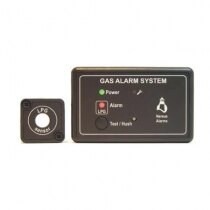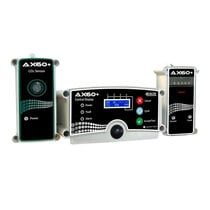-
Contact
Sales & Customer Service
0800 612 6537 support@safelincs.co.uk Live ChatDelivery Enquiries
0800 077 6149 - Resources
Fire & Safety Solutions
CALL OUR TEAM NOW 0800 612 6537
Lines open today 8am - 6pm
FREE Delivery
on marked products
Live Chat - Online
Instant help & Advice
Trade Discounts
and exclusive pricing
0% Credit Available
Open an account now
5 Star Customer Feedback
Fixed and Portable Gas Detectors
Every year, people discover a truth they wish they'd known sooner: the most dangerous gases give no warning. No smell. No visible signs. Just silence before catastrophe strikes. Gas monitor alarms protect against specific, invisible threats - from CO2 in pub cellars to carbon monoxide and LPG in boats, our range includes detectors for every environment where dangerous gases can accumulate without warning. Understanding Your Gas Monitor Alarm Options In a pub cellar, CO2 from beer taps can build up quickly and pose a serious risk. An Analox Ax60+ CO2 monitor provides protection, with its alarm alerting staff to the danger. These aren't everyday smoke alarms. We've selected each gas detector to protect against specific, invisible threats. For boat owners: The Nereus LPG and Carbon Monoxide detector stands guard against two silent killers. Its waterproof sensors mount low in the bilge where dangerous gases collect first. For businesses and schools: The Analox system protects cellars, laboratories and greenhouses where CO2 accumulates without warning. For homes: The AMS S/200P gas alarm detects butane, propane and natural gas leaks. Certified to EN 50194-1: 2009 standards. Don't wait for a close call to become your wake-up call. Explore our gas detection range. Because everyone deserves protection from dangers they can't see coming. Frequently Asked Questions (FAQs) Does a carbon monoxide detector detect gas? A carbon monoxide detector is designed to detect CO only: you need separate detectors for natural gas or LPG leaks. What do I do if a gas alarm goes off? Your immediate response is to evacuate everyone, avoid using electrical switches, open windows and doors if safe, and call the gas emergency helpline from outside the property. What is the best carbon monoxide and gas detector? The best detector is one certified to detect both CO and gas leaks in a single unit, like our Nereus marine alarm for boats. How often should gas detectors be tested? Testing is recommended monthly using the test button to ensure the alarm sounds correctly and the unit responds properly. Where should I install my gas detector? Installation is critical: mount CO detectors at breathing height, LPG detectors low (heavier than air) and natural gas detectors high (lighter than air).
Read more about gas detectors...
Nereus LPG and Carbon Monoxide Gas Boat Alarms
- Mains powered LPG and CO (carbon monoxide) detector
- Designed specifically for use on boats
- Unique waterproof sensors can be mounted low in the bilge
- LED indicators to show power and alarm status
Analox Ax60+ Fixed CO2 Monitor, Sensor and Alarm Kit
Professional, reliable carbon dioxide detection, monitoring & warning. Ideal for pub cellars, schools, labs, greenhouses, and more.
- Relays can activate fans and gas shut-off valves
- Easy to install Quick Connect fittings – no difficult wiring
- Expandable system, install additional sensors and alarms at any time
- CE marked, UL certified, and EH40 compliant
AMS S/200P LPG and Natural Gas Alarm
- Certified to EN 50194-1: 2009
- Detects butane, propane and methane (natural gas)
- 230V mains powered (cable with 3 pin plug)






















